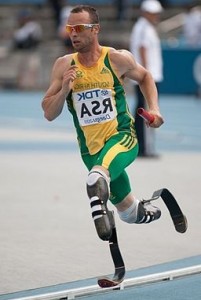 Describe the culture of your workplace.
Describe the culture of your workplace.
Can you even?
It’s not easy to pinpoint, since workplace culture typically comprises unconscious assumptions shared by the people involved.
Not easy, unless you’re sportswriter Michael Sokolove, who recently wrote about Oscar Pistorius, the top-ranked 400-meter runner and 2012 London Olympics hopeful.
Pistorius runs with extraordinary athletic ability, and uses prostheses called Flex-Foot Cheetas because he was born without the fibula bone in either of his legs. Sokolove wrote in The New York Times Magazine about the ways Pistorius is forging a new culture on the track field, and more generally in competitive athletics. Sokolove talked to a colleague about his experience following Pistorius. In the interview, he says:
In my mind, there is an image of an Olympic-level runner. He is a human thoroughbred, powerful and graceful, like Michael Johnson, the world-record holder in the 400 meters. Oscar is certainly powerful, and graceful in his own way, but I could not look at him and say: this is the highest order of the human form. You can’t. There’s something missing. So I had to adjust my mind and say: this is also a runner, possibly an Olympian, and regard him on his own terms.
Sokolove speaks for so many when he describes this mental image of an Olympic runner, which is laden with assumptions about gender, physical looks, age, as well as ability. These are some of the intangible components of the culture of competitive sports, which Pistorius continues to challenge.
How? Read more